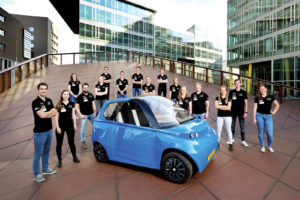
The mantra, “reduce, reuse, recycle” has been taken to a new level by students at Netherlands Eindhoven University of Technology. They developed an ultra-sustainable electric car that gets a remarkable 744 miles to the gallon. The students considered the environmental impact of every aspect of the automobile, including production, consumption and recycling, in order to create a prototype that is completely circular in its lifespan.
Dubbed Noah, the car features biological materials wherever possible. The team began with a bioplastic that can be made from sugar. The chassis and interior consist of sandwich panels made of the bioplastic and flax fiber. The body is made of flax mats that are injected with a biobased resin. The materials require up to six times less energy to produce than typical materials like aluminum or carbon.
Noah weighs about 794 pounds without batteries—less than half the weight of comparable production cars. Yet it is sturdy, spacious and designed for city driving. The design team vouches for the car’s strength and says it is possible to create a crumple zone-like structure. The two-seater can reach a top speed of 68 mph and has a range of 150 miles. With batteries, it weighs about 926 pounds, which provides good road holding.
At the end of its life, Noah will not end up at the junkyard. The biocomposite can be repurposed as a raw material for other products, such as building blocks, and the nonorganic parts of the car can be recycled. For more information, visit www.tue.nl.
 TEXTILES.ORG
TEXTILES.ORG


